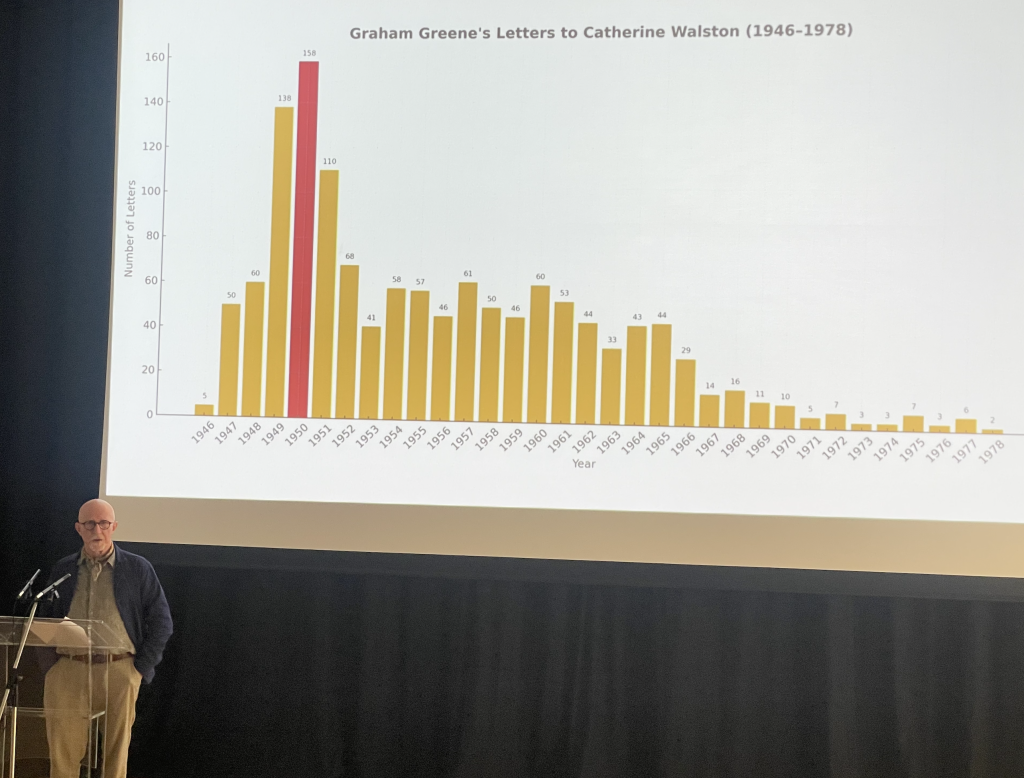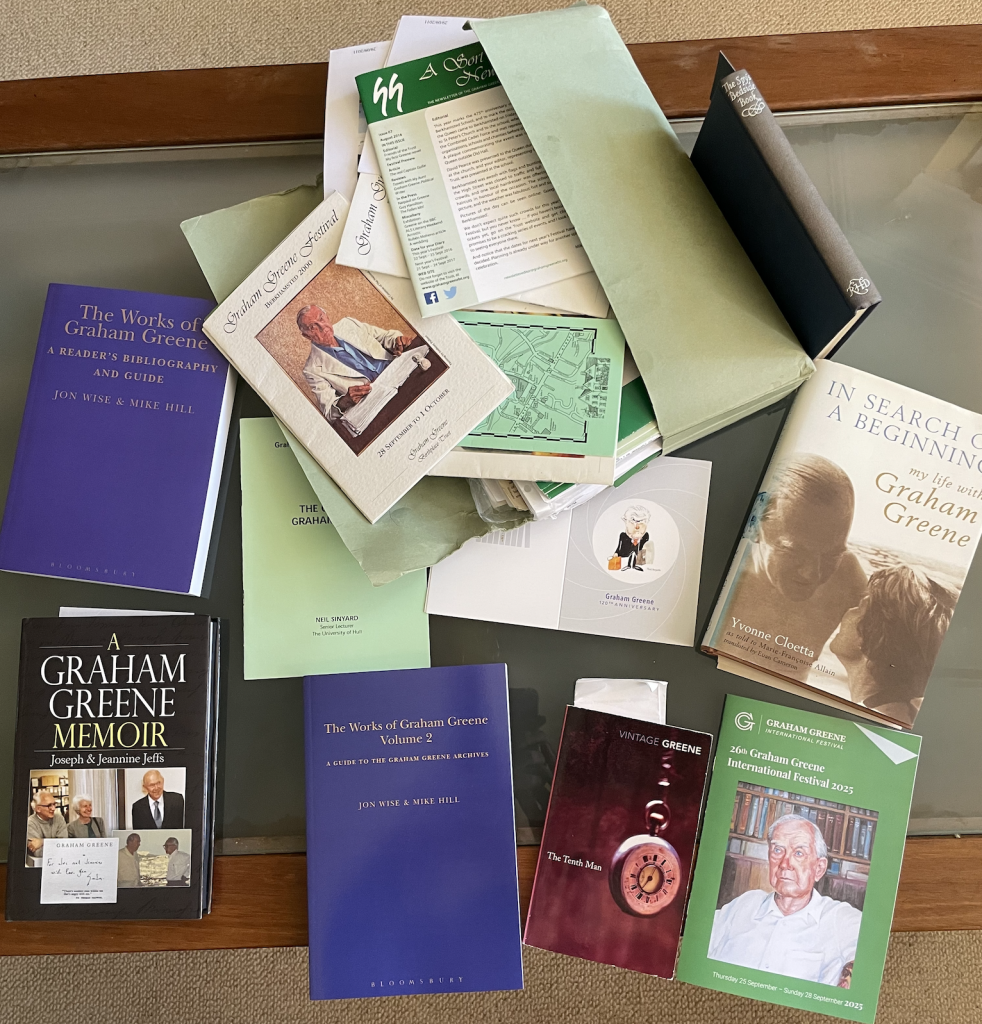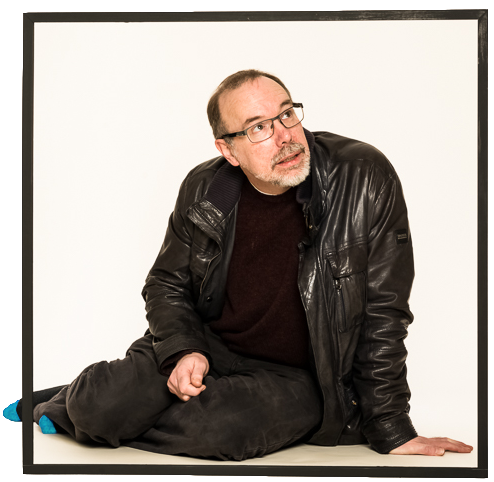Greeneland goes to Berkhamsted
This annual festival, organised by the Graham Greene Birthplace Trust charity, is a labour of love by Greene enthusiasts, and this was my third visit. I wrote about last year’s here and this year I’ll also give a brief account of the festival. Note that, while I’m putting this on my blog this year (search Graham Greene in the bar on the left if you want to see my earlier posts about Greene), my Greene writing from now on will appear on Substack, where there’ll be a longer version of this post. Bonus pieces there will complement the serial novel I begin to publish in a month’s time, each post appearing a hundred years to the day after the one on which it is set, during the four formative months Greene spent in Nottingham.
Please subscribe for free here, then you’ll receive every post by email.
Last year, I managed to get lost but this year I was able to join Richard Shepherd’s guided tour of Berkhamsted common (A Battlefield Guide) on a glorious afternoon. A gentle three mile stroll took us to the trenches that appear in more than one story and the likely site of the Russian Roulette revolver incident in Greene’s mid-teens with our keen, knowledgeable guide. Here’s Richard talking about that, with festival director Richard Greene in the foreground on the left.

In the evening, the inestimable Mike Hill introduced Fritz Lang’s film of The Ministry of Fear, which it was good to see on a big screen. He and Creina Mansfield also did a terrific double act talking about the novel in the final session I saw on Saturday afternoon.
Friday was dominated by the guest appearance of Armando Ianucci, who I’m a big fan of. The hall was rammed. We learnt that he’s a huge fan of The Confidential Agent and Our Man in Havana (which people tried to persuade him to remake) and a lot of time was spent on his adaptation of the graphic novel La Mort de Staline. For me, however, Fridays’s main interest lay in the morning, when Jon Wise talked about England Made Me. Jon, together with Mike, makes up the glue that holds the festival together with their insightful, diligent work done over decades, including the essential two volume bibliography, which was of great use to me when I visited the Greene archives in Austin, Texas. I’ve acquired a first edition of this early novel but have yet to get round to rereading it, so wasn’t aware that there had been substantial revisions made by Greene when the novel was reprinted in the first collected edition (the version I’ve read). When time allows I plan to do a compare and contrast.

Later in the morning, Greene scholar Ian Thomson gave an absorbing talk on the Hotel Olaffson in Port-au-Prince, the fascinating ‘gingerbread’ hotel where Greene set much of The Comedians. Recently it was burnt down by gangs in lawless Haiti. Ian talked about his visits there and meeting the original of Greene’s Petit Pierre, the journalist Aubelin Jolicoeur. There’s an ongoing debate about whether The Comedians is one of Greene’s better novels and, again, it’s nearly fifty years since I read it so I can’t say, though I do know that the film isn’t up to much and the family have recently reacquired the rights.
Shirley Day gave an absorbing talk about adaptations of Brighton Rock on the Saturday morning, the Rowan Joffe 2011 adaptation having been shown the night before (watchable but not a patch on the original – updating it to 1964 adds little). Adaptation studies is a growing discipline in film and literary studies as well as Creative Writing. The area will, I suspect, become increasingly popular in what’s left of The Humanities in academia. Shirley had unearthed a fascinating letter in which Greene admitted that he’d accidentally cut the details of how Hale died from the novel, something which made the adapters’ task more challenging.
The highlight of the conference, for me and many others, came either side of lunch, with a focus on reclaiming Greene’s relationship with Catherine Walston, which some biographers have reduced to salacious gossip, with little respect for either of the lovers. This isn’t the place to discuss it at length (and the long affair falls beyond the scope of my own Greene project). Historian Kevin Ruane is editing the Greene-Walston letters and has just finished transcribing 400,000 words of them (yes, that figure is correct) with a view to publishing an edited version, while the whole transcript could be made available via a website. As with Vivien’s letters to Greene, the majority are lost (probably destroyed in a bonfire he had before moving to Antibes in the mid-60s) but Kevin has found ways to restore the missing women to the story. He is also the incoming director of the festival and will, I’m certain, do a great job. He’s a very distinguished historian who brings a kind of rigour to his research that us literary types rarely possess, and we’re lucky to have him. Here he is, presenting.

In the afternoon we got another side of the Walston/Greene relationship. Angela Maye-Banbury, formerly of Sheffield Hallam, talked about the couple’s times on Achill Island, off the West Coast of Eire, where and her husband live, a place the couple loved (and, arguably, where they fell in love). I’m going to have to visit one day. The afternoon ended with the birthday toast (a few days early) made by Greene’s grandson, Jonathan Bourget, with wine from his own vineyards. It was great once again to chat with Jonathan about his grandfather.

Another terrific festival, run with love in the perfect location. I enjoy exploring Berkhamsted between sessions, and found some new places this year. On one of my walks, for instance, I discovered that, in Greene’s day, before a spring ran dry, Berkhamsted supplied much of the country’s watercress. Next year, I’ll avoid leaving early (for a family visit that didn’t happen, because the clutch went on my car as I got on the M25. Took me seven hours to get home). In closing, thanks to outgoing festival director Richard Greene (no relation) author of the best and most recent Greene biography. He’s done a sterling job and will, I know, keep returning to enjoy this most rewarding of festivals. Thanks also to all the volunteers who makes the festival, which is run by a tiny charitable trust, such an enduring success.
Below is the haul of books and ephemera I brought back from Berkhamsted – if you want a more detailed description and an account of what’s in the fat folder, sorry, but you really ought to subscribe to Greeneland where most of my writing will appear from now on.

